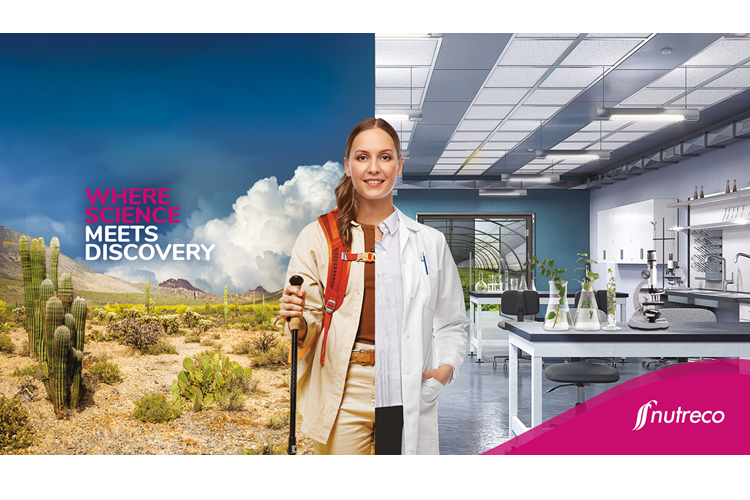Nutreco’s Garden of the Future is bringing a whole new, ground-breaking array of phytotechnology solutions to the livestock feed and aquaculture industry. And it’s all due to the incredible expertise we have within our team, and how, together, they are using the power of nature to help animals overcome today’s challenges. We talked to Dr. Karin Berger, Phytotechnology Discovery Director at Nutreco Exploration, about her long and remarkable career – and what makes the team, and its way of working, so unique.
Building a bridge between the phytopharmacy and the feed industry

Karin is about as experienced as it gets in her field. Having worked for over 25 years in botany, pharmacognosy, phytochemistry and pharmacology, she has truly dedicated her professional life to researching medicinal and functional plants. Together with the Director of Nutreco Exploration’s Phytotechnology Program and Nutreco’s Garden of the Future, Dr. Bernd Büter, she even started two companies of her own over the years, learning everything there is to know about developing plant-based materials for products ranging from phytopharmaceuticals and food supplements, to cosmetics, to feed and feed additives. And since 2021, Karin has been part of Nutreco!

Thinking back to how it all started, Karin said, “During my studies, I was very fascinated by plants, by their diversity, between the species, within the species – how they adapt to their environment, protect themselves from predators, attract pollinators and keep other plants away from them.That was really something I wanted to dive into.” She said plants were especially fascinating, because there is such a huge variety, and they have very specific compounds that can be used in many ways. “For me, using medicinal plants to treat or to prevent diseases is the most interesting part of my field.”
Today, Karin leads Discovery at Nutreco’s Garden of the Future in Thurgau, Switzerland, in what is referred to as the Phyto Valley. It’s the perfect place for this facility, partly because it’s home to many pharmaceutical and life science companies and has an excellent university nearby with a huge life science department. In addition, Thurgau’s geography offers just the right conditions for experimental plant cultivation.
At Nutreco, Karin oversees an extremely diverse and unique team of people: experts from the animal nutrition industry, phytochemists, chemists, biologists, herbalists and plant growers – a very interdisciplinary group. And that's important! Connectivity between specialists in all disciplines is required to discover PhytoComplexes relevant to our animal industry. Everyone on the team speaks the same language and shares the same thinking and the same goal – which really facilitates collaboration. Functioning in a discovery environment with this kind of expertise is leading to exciting innovation. “We are thinking out of the box here,” said Karin. “People are not just focused on their own areas of expertise but open to everything and with a holistic view: looking all around them to what their colleagues are doing. I think that’s one reason we’re successful.”
Bringing the team together under one roof has created a situation unlike anything else in the industry. As a result, the work being done at Nutreco’s Garden of the Future is creating products of a quality and consistency that is unmatched, and very difficult to replicate. The facility handles every aspect of discovery, plant domestication, cultivation and product development in one place, in close connection with Nutreco’s business lines, Trouw Nutrition and Skretting. “In my earlier career, we developed the plant material for customers and then they took over – we’ve never had this kind of visibility and interaction all the way through to the end product before,” said Karin.
How do we do it? The Nutreco Exploration team first consults with the business to decide which animal challenges to address. Then the team defines suitable molecular targets involved in the process they want to impact. They select biological models to test the efficacy of plant candidates on these targets.” said Karin.
After that, the team selects the plant candidates using various techniques. Chemotaxonomy, for example, can help them find a species with a specific phytochemical composition or that enables us to achieve multiple targeting effects.
“We consider criterium such as IP landscaping, to determine whether the potential product candidates can be protected by a patent, or cultivation feasibility to narrow down our list,” Karin explained. The final short list of plants is then tested for effectiveness in the target animal species.
The way I see it, at Nutreco’s Garden of the Future, we are building a bridge between the phytopharmacy and the feed industries,” said Karin. “We are bringing all this knowledge to the animal nutrition space. We’ll need to educate people on our products, because the PhytoComplexes we are developing are very different from what our industry has used until now, but I think we’ll be successful in the end – and create a whole new solution for keeping animals healthy and productive.
Media contact
